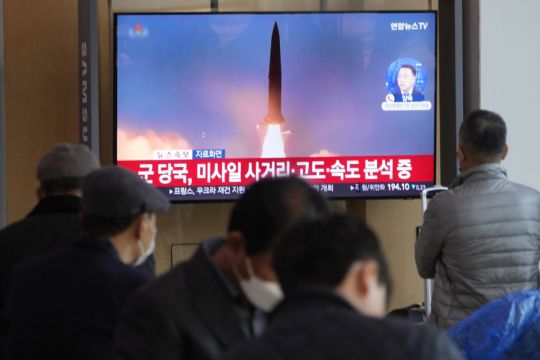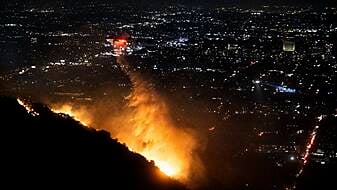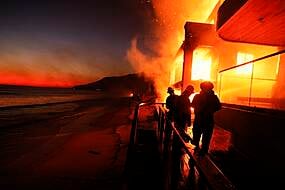Air raid sirens sounded on a South Korean island and residents evacuated to underground shelters after North Korea fired more than 20 missiles, with at least one landing near the rivals’ tense sea border.
South Korea quickly responded by launching its own missiles in the same border area.
The launches came hours after North Korea threatened to use nuclear weapons to get the US and South Korea to “pay the most horrible price in history” in protest over the ongoing South Korean-US military drills that it views as an invasion rehearsal.

The White House maintained that the United States has no hostile intent towards North Korea and vowed to work with allies to curb North Korea’s nuclear ambitions.
The North’s barrage of missile tests also came as world attention was focused on South Korea following a weekend Halloween tragedy that saw more than 150 people killed in a crowd surge in Seoul in what was the country’s largest disaster in years.
South Korea’s military said North Korea launched at least 23 missiles — 17 in the morning and six in the afternoon — off its its eastern and western coasts.
It said the weapons were all short-range ballistic missiles or suspected surface-to-air missiles.
Also on Wednesday, North Korea fired about 100 artillery shells into an eastern maritime buffer zone the Koreas created in 2018 to reduce tensions, according to South Korea’s military.
The 23 missiles launched is a record number of daily missile tests by North Korea, some experts say.
One of the ballistic missiles was flying towards South Korea’s Ulleung island before it eventually landed 104 miles north west of the island.
South Korea’s military subsequently issued an air raid alert on the island, according to the South’s Joint Chiefs of Staff.
South Korean media published photos showing island residents moving to underground shelters.
Hours later on Wednesday, South Korea’s military said it lifted the air raid alert on the island.
South Korea’s transport ministry said it has closed some air routes above the country’s eastern waters until Thursday morning in the wake of the North Korean launches.
That missile landed 16 miles away from the rivals’ sea border. It landed in international waters but far south of the two countries’ border, off the east coast of South Korea.
South Korea’s military said it was the first time a North Korean missile had landed so close to the sea border since the countries’ division in 1948.
“This is very unprecedented and we will never tolerate it,” South Korea’s Joint Chiefs of Staff said in a statement.
In 2010, North Korea shelled a frontline South Korean island off the peninsula’s western coast, killing four people.
But the weapons used were artillery rockets, not ballistic missiles whose launches or tests are banned by multiple UN Security Council resolutions.
Later on Wednesday, South Korean fighter jets launched three air-to-surface, precision-guided missiles near the eastern sea border to show its determination to get tough on North Korean provocations.
South Korea’s military said the missiles landed in international waters at the same distance of 16 miles north of the sea border as the North Korean missile fell earlier Wednesday.
It said it maintains a readiness to win “an overwhelming victory” against North Korea in potential clashes.
South Korea’s Joint Chiefs of Staff earlier identified three of the North Korean weapons launched as “short-range ballistic missiles” fired from the North’s eastern coastal town of Wonsan, including the one that landed near the sea border.
North Korean short-range weapons are designed to strike key facilities in South Korea, including US military bases there.
In an emergency meeting with top security officials, South Korean President Yoon Suk Yeol ordered officials to take swift unspecified steps to make North Korea face consequences for its provocation.
He said he would consider the North Korean missile’s landing near the border “a virtual violation of (our) territorial waters”.







